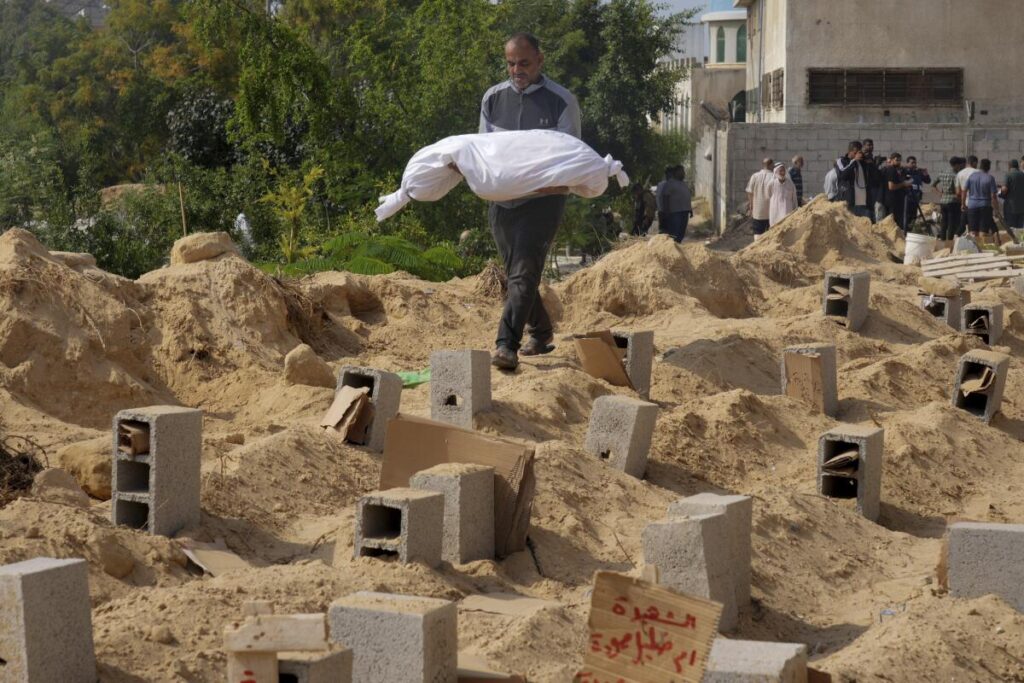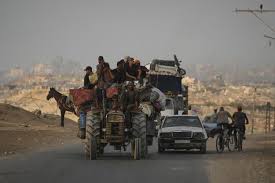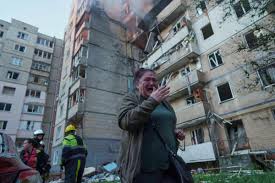
It was neither the place nor the time for a proper goodbye, said Omar Dirawi. Not here, in this dusty field strewn with dead people wrapped in blankets and zipped up in body bags. And not now, as Israeli airstrikes crashed around him for the third week, erasing more of his neighborhood and sundering hundreds of families and friendships.
Yet on this October week in Gaza’s central town of Zawaideh, the 22-year-old Palestinian photojournalist buried 32 members of his family who were killed in Israeli air raids last Sunday.
Dirawi’s aunts, uncles and cousins from Gaza City had heeded Israeli military evacuation orders and taken refuge in his home farther south. Days later Dirawi was unloading their bodies from the back of a truck, digging a narrow trench partitioned with cinder blocks and reciting abbreviated funeral prayers before nightfall, when Israeli warplanes screeched and everyone ran indoors.
“There’s nothing that feels right about this,” Dirawi said of the mass burial. “I haven’t even grieved. But I had no choice. The cemetery was full and there was no space.”
Palestinians say this war is robbing them not only of their loved ones but also of the funeral rites that long have offered mourners some dignity and closure in the midst of unbearable grief. Israeli strikes have killed so many people so quickly that they’ve overwhelmed hospitals and morgues, making the normal rituals of death all but impossible.
Since Oct. 7, when Hamas mounted a bloody and unprecedented attack on Israel, the Israeli military’s response has left over 7,700 Palestinians dead, said the Gaza-based Health Ministry. Of the dead, it added, nearly 300 have not been identified. Fear and panic were spreading Saturday as Israel expanded its ground incursion and intensified bombardment.
An estimated 1,700 people remain trapped beneath the rubble as Israel’s air raids impede and imperil civil defense workers, one of whom was killed during a rescue mission Friday. Sometimes it takes days for medics to recover bodies. By then corpses are often too swollen and disfigured to be recognizable.
“We have hundreds of people being killed every day,” said Inas Hamdan, a Gaza-based communications officer for the U.N. Palestinian refugee agency. “The whole system in Gaza is overwhelmed. People are dealing with the dead however they can.”
Overcrowded cemeteries have compelled families to dig up long-buried bodies and deepen the holes. That’s how survivors interred Bilal al-Hour, a professor at Gaza’s Al Aqsa University, and 25 of his family members killed Friday in airstrikes that razed their four-story home in Deir al-Balah.
Al-Hour’s brother, Nour, exhumed his family’s old plots in the local cemetery Friday to place the newly deceased inside. His hands dark with grave dirt, he became breathless listing each relative being lowered into the ground.
“There’s Bilal’s son with his wife and children, his other younger son and of course his daughter who finished high school last year and was supposed to be a doctor,” he said before trailing off and quoting the Quran. “To Allah we belong, and to him is our return.”
Overflowing morgues have compelled hospitals to bury people before their relatives can claim them. Gravediggers have laid dozens of unidentified bodies side by side in two large backhoe-dug furrows in Gaza City now holding 63 and 46 bodies, respectively, said Mohammed Abu Selmia, the general director of Shifa Hospital.





